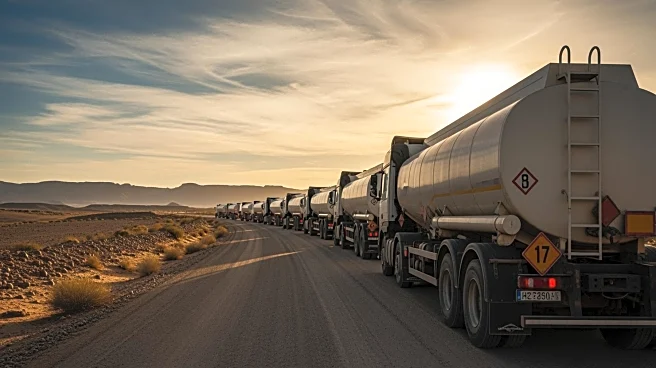What's Happening?
Niger has delivered 82 fuel tankers to Mali to alleviate a severe fuel shortage caused by insurgent blockades. The tankers traveled 1,400 kilometers from Niamey to Bamako, arriving amid a national fuel crisis and ongoing insecurity. The blockade, imposed
by al Qaeda-linked militants, aims to destabilize Mali's military-led government by restricting energy supplies. The fuel shortage has led to temporary school closures and disrupted public transport, affecting students and teachers. Classes resumed on November 10, but challenges persist in rural areas due to lingering shortages.
Why It's Important?
The fuel delivery from Niger is crucial for Mali, which is grappling with a severe energy crisis exacerbated by militant activities. The blockade by Jama’at Nusrat al-Islam wal-Muslimin (JNIM), an al-Qaeda-affiliated group, highlights the ongoing security challenges in the Sahel region. This situation underscores the need for international and regional cooperation to address insurgent threats and stabilize affected areas. The crisis impacts Mali's economy and social infrastructure, with potential ripple effects on neighboring countries and regional stability.
What's Next?
Mali may continue to seek international support to overcome the fuel crisis and counter insurgent activities. Russia has pledged to supply petroleum and agricultural products, although deliveries are unconfirmed. The involvement of Russia's Africa Corps in escorting fuel convoys suggests ongoing efforts to secure supply routes. The situation may prompt further diplomatic and military engagements to ensure stability and support economic recovery in Mali and the broader Sahel region.
Beyond the Headlines
The crisis in Mali reflects broader geopolitical dynamics in the Sahel, where insurgent groups exploit regional vulnerabilities. The involvement of international actors like Russia indicates shifting alliances and strategic interests in Africa. The humanitarian impact, including school closures and transport disruptions, highlights the urgent need for comprehensive solutions addressing both security and development challenges. Long-term stability may require coordinated efforts to strengthen governance and counter extremist ideologies.

















